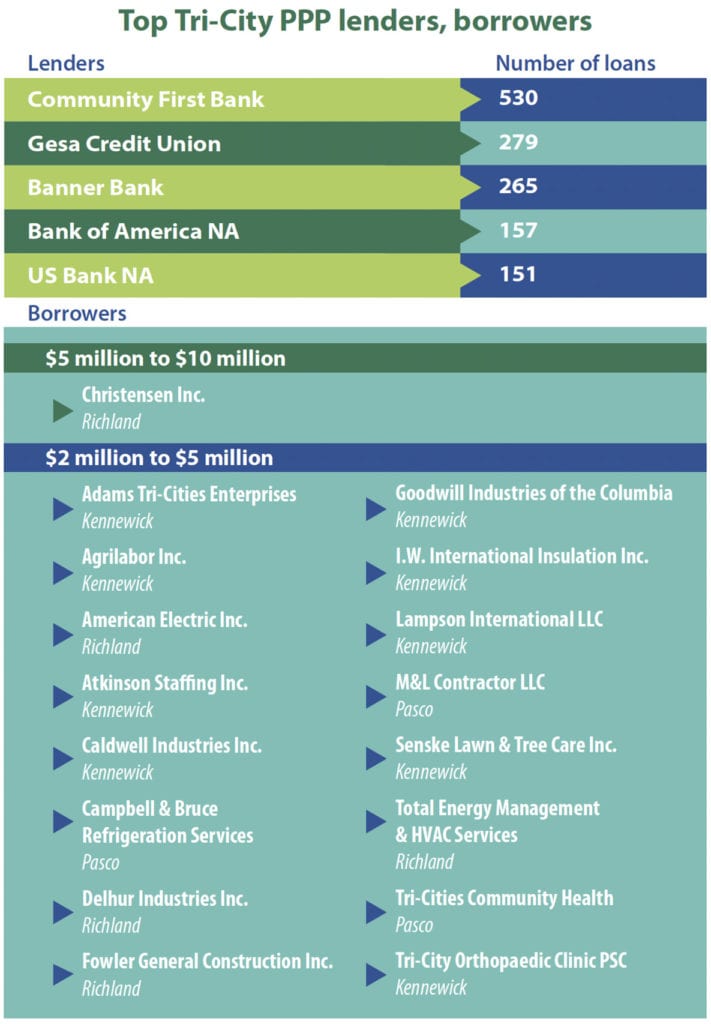
Home » PPP applications pushed lenders to their limits
PPP applications pushed lenders to their limits

July 15, 2020
Talk was going around. Politicians in Washington were developing a coronavirus package with a generous program to save jobs at small businesses affected by the pandemic.
Eric Pearson, chief executive officer of Kennewick-based Community First Bank, recalls the talk. Nothing was official. The Coronavirus Aid Relief and Economic Security (CARES) Act hadn’t been signed into law.
Then a client called. He was watching the bill work its way through Congress to the president’s desk. The client intended to apply for the Paycheck Protection Program, a forgivable loan, to save his business.
With that, Pearson’s team realized what was coming.
In normal circumstances, Community First processes five to six loans a day. But it has hundreds of business clients. Most would apply for the PPP loans, which are guaranteed by the Small Business Administration.
“We were woefully unprepared,” Pearson recalled.
Community First wasn’t alone. Banks and credits unions with commercial divisions braced for applications, particularly during the frantic first round when applicants feared the initial $349 billion would run out.
They were right. Funds were exhausted in 13 days. The program was replenished with an added $300 billion. Applications for the second round are set to close Aug. 8 after Congress extended the original June 30 deadline.
For financial institutions, the harried days of early April demanded that every employee put in long hours and weekend shifts to process the deluge of applications.
For most, it was a shining moment to help new and existing customers secure the money they needed to keep employees on the payroll as the Covid-19 crisis forced nonessential businesses to close in Washington state and elsewhere.
Nationally, nearly 5,500 lenders processed 5.6 million loans totaling more than $512 billion. In Washington, 95,000 entities were approved for $12 billion, according to the SBA.

Nearly 500 Tri-City businesses representing nearly 20,000 local jobs received $150,000 or more, and about 2,200 received up to $150,000 to support about 12,000 jobs, according to information released July 6 by the U.S. Small Business Administration under the Freedom of Information Act.
The company that publishes the Tri-Cities Area Journal of Business received a loan in the latter category.
The recipients represent every aspect of the local economy: Agriculture, real estate, hospitality, fast food, coffee shops, brewpubs, law firms, manufacturers, contractors, churches and nonprofits.
Collectively, PPP loans supported about one in five of the 150,000 local civilian positions tallied by the Washington Employment Security Division in May.
Community First Bank was the leading local lender in both categories, according to its analysis of the new data. Pearson said it had about two weeks to prepare for the SBA application portal to go live.
It sketched a plan to manage loan applications and enlisted tech vendors to help. More than 150 clients inquired before the program opened. Double the number called after.
Commercial loan officers engaged with clients. Employees from HR, accounting, wealth management, loans and deposits carried out the labor-intensive task of processing applications and inputting them into a “buggy” SBA system.
Staff worked 12 to 14 days, including weekends. They processed 500 applications and funded nearly $90 million in loans in the first phase, collectively supporting roughly 14,000 local jobs. About a hundred more came in the second phase.
Pearson echoed another banker’s description of the program — that it was like running a successful restaurant in New York City and having all your patrons come on one night.
“For about two weeks it was absolute mayhem,” he said. Knowing employees were helping preserve jobs lent urgency to the work.
“They were all motivated by the fact they were helping these small businesses,” he said.
Ben Rutledge, vice president of commercial lending and services for Richland-based Gesa Credit Union, said there was trepidation about risking its money on an SBA guarantee.
A decade ago, the SBA had a reputation for challenging guarantees when loans went bad.
PPP applicants initially didn’t have to meet the usual creditworthiness standards to qualify for the loans. Although the goal is to forgive most if not all loans, Gesa was concerned.
“You had lenders needing to decide if they were going to get into the game, could we trust the SBA to honor their guarantee. When we started funding loans, we were apprehensive to do that,” he said.
Gesa proceeded with the first and second rounds. If there’s a third, it won’t take part.
“It was very crazy,” he said.
Gesa processed loans ranging from $7,000 and up. Its average PPP loan in the first round was $70,000, he said.
Despite the misgivings, Rutledge said PPP was a positive experience. Gesa wanted to help small businesses in crisis.
“People in our institution and all financial institutions stepped up. You had bankers working 15 hours a day to get these done,” he said.
Sue Horton, president of Spokane-based Wheatland Bank, heard the misgivings about the SBA guarantees. She didn’t share them.
“We concluded our government is trying to help business,” she said.
Wheatland issued 665 PPP loans totaling $75 million, with nearly $15 million in its Pasco branch. The average Tri-City loan was for $113,269.
Wheatland, with a focus on commercial and agricultural banking, embraced PPP. When rival banks shut down their portals, it aided distraught customers, winning some over as new clients.
Wheatland required PPP borrowers to have dedicated accounts for tracking purposes. By early July, 56 percent of its Tri-City customers had spent all their PPP funds. Seventy-one of 127 had reached the loan “forgiveness” threshold.
Financial Institutions aren’t eligible for PPP money, but the program is helping offset other Covid-19 losses.
When the Federal Reserve slashed interest rates, it repriced variable rate loans like the agricultural lines of credit that are a mainstay of Wheatland’s business. PPP fees balance out those losses.
“We’re going to have a record year this year because of this,” she said.
The industry is bracing for the other shoe to drop. PPP recipients have until October 2021 to apply for loan forgiveness. At present, it is a complicated process, akin to filing a tax return.
The Independent Community Bankers of America and other entities are lobbying Congress to allow most borrowers to sign statements instead.
“If the goal is really for everything to be forgiven, why put all these people through all this work?” Horton said.
Columbia Bank, with local branches in Richland and Pasco, funded nearly 4,400 businesses with PPP loans totaling nearly $1 billion.
That represents about 70,000 jobs, said David Moore Devine, executive vice president and chief marketing and experience officer for the Tacoma-based institution.
Moore Devine said the bank knew the government would build a program to support businesses. But the nature of the program and the rules that changed daily until the application portal opened were a challenge.
“Businesses want a degree of certainty. When rules and guidelines change, that can be difficult,” he said.
But the long days and spirit of camaraderie underscored the importance of the work.
“It’s the kind of thing that unifies a culture. We are really motivated by helping our community,” he said.
Local News Banking & Investments
KEYWORDS july 2020





